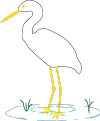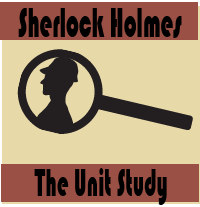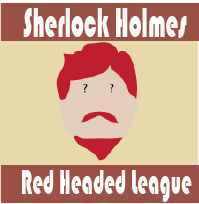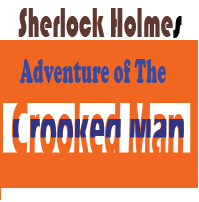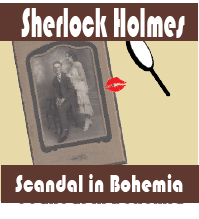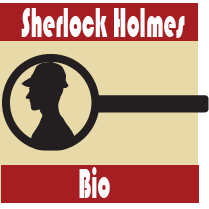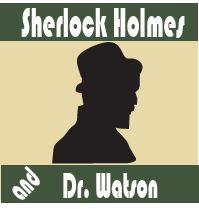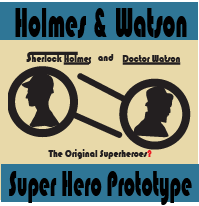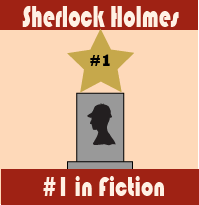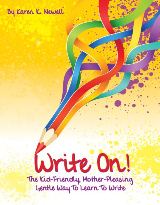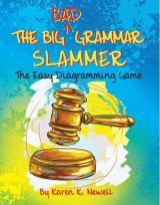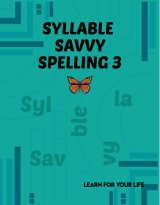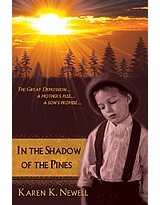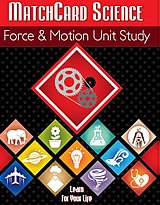Sherlock Holmes Consulting Detective
Sherlock Holmes was the world's most famous consulting detective. Of course, the fact that he was the one and only consulting detective made it a bit easier to capture that title.

Biographical Facts About Sherlock Holmes
Occupation: Consulting DetectiveBegan his career: 1880
Years in Practice: 23
Business Partner: Dr. John H. Watson (his wife called him James, Sherlock simply called him "Watson"
Marital Status: Single (He remained a bachelor in spite of his partner's earlier attempts at matchmaking which were abandoned due to lack of success.)
Address: 221B Baker Street, London
Ethnicity: Bohemian
Known Relatives:
- Father - wealthy country squire (apparently deceased)
- Brother - Mycroft
- His grandmother was the sister of the French artist, Vernet
- Remote cousin, Verner, mentioned one time (The cousin bought Watson's medical practice.)
Hobbies and Other Interests
Violinist
He is an expert violinst, a composer, owns a Stradavarius, enjoys musical concerts, and is an expert on Paganini, Stradavarius, Amati, and Cremona fiddles. He is also an expert on music of the Middle Ages.Boxing, Swordsman, Wrestling
These are classified together for obvious reasons and skills that came in handy as he tangled with the criminal class. We can also add Japanese wrestling and pistol practice to his skills.Chemistry
He made chemistry his area of study in college (apparently.) Test tubes and "malodorous" experiments were part of life at 221b Baker Street.Writer
He wrote multiple articles on scientific and semi-scientific subjects, usually (but not always) related to criminology.Personality:
Believed himself to be a very logical and non-emotional person. In reality, he was quite emotional but preferred to deny it.He was a Type A person, a strict work-a-holic with very few friends or desire for a social life apart from solving mysteries. See below on this page for more information about his personality.
Social Life
: He intentionally minimized social contacts. While he was famous and well-liked, he made few close friends and discouraged visitors. He stated he made only a few friends in college. During his professional years, Watson and a few inspectors were the extent of his close friends. Even in his retirement, while maintaining a distant friendship with Watson, he cultivated only a few friends in his secluded community. Many people consider him an isolationist or sociopath for these reasons, but there are a lot of modern males who have only one or two friends at any one time.Vices
Included tobacco and, at least in his younger years, cocaine. He either out grew the cocaine or his partner's words of warning were eventually heeded. See below on Adrian Conan Doyle's description of his father's created character and his cocaine use.Watson's Description About Holmes
From The Red Headed League"My friend was an enthusiastic musician, being himself not only a very capable performer but a composer of no ordinary merit."
What Is A Consulting Detective?

Holmes Description of his career shortly after meeting Watson
From The Study In Scarlet"Well, I have a trade of my own. I suppose I am the only one in the world. I'm a consulting detective, if you can understand what that is. Here in London we have lots of government detectives and lots of private ones. When these fellows are at fault, they come to me and I manage to put them on the right scent. They lay all the evidence before me, and I am generally able, by the help of my knowledge of the history of crime, to set them straight...
They are all people who are in trouble about something and want a little enlightening. I listen to their story, they listen to my comments, and then I pocket my fee."
"But do you mean to say," I said, "that without leaving your room you can unravel some knot whcih other men can make nothing of, although they have seen every detail for themselves?"
"Quite so. I have a kind of intuition that way. Now and again a case turns up which is a little more complex. Then I have to bustle about and see things with my own eyes."
It is fortunate for the readers that Watson chose only to write about those "more complex" cases which required Holmes to leave his sitting room and do the sleuthing on his own. Not only did his willingness to leave his arm chair distiinguish him from his older brother (who did not), but it also produced far more interesting stories for five generations of fans.
Watson Describes Holmes
From The Resident Patient"Neither the country nor the sea presented the slightest attraction to him. He loved to lie in the very center of five million people, with his filaments stretching out and running through them, responsive to every litte rumor or suspicion of unsolved crime. Appreciation of nature found no place among his many gifts, and his only change was when he turned his mind from the evil-doer of the town to track down his brother of the country."
Sherlock Holmes Character Analysis
His personality traits included:- Austere
- Can be cold and menacing
- Hawk-like appearance
- Tall, thin
- Nervous gestures
- Bright eyed and intense when focused
- Dual nature with periods of boredom between periods of active, focused, productive energy
- Unattracted to women, treats them well but distrusts them
- Has many associates but few close friends
- Noted for kindness & generosity to those in need
- His past clients recommend him - both for his successful work and his kindness
- It is kind actions, rather than a kind persona, which accounts for his reputation for kindness
- Describes himself as having a limited sense of humor, but known to be glib and flippant
- Becomes bored, then restless, then depressed when he does not have an active case. Such moods are unknown while engaged in hot pursuit.
- Workaholic - only takes a few "holidays" when forced to by his physician
- Risk taker
- Believes in justice and fairness
- Expertise on a wide variety of subjects
- an exceptional conversationalist (at least one the not too common occasions when he choses to socialize)
- avoids public recognition but enjoys the praise of those in his company
- said to be hypnotic and soothing when he chose (H-44 REDC)
- It was one of my friend's most obvious weaknesses that he was impatient with less alert intelligences than his own. (H42-BRUC)
- Maintained a cool, indifferent exterior that covered the kindness and tenderness beneath
- Could detach himself mentally in the middle of a case to do something else
The REAL Sherlock Holmes - Per Doyle's son
Holmes was a puppet sitting on my father's knee.
The information below is transcribed from a 1969 interview with Arthur Conan Doyle's youngest son, Adrian Conan Doyle, and Joan Bakewell. The interview can be found on youtube.Sherlock and Drug Use
You have a certain feel coming out of Victorian authors. To make a man outstanding you have to give him certain peculiar vices of his own. So he made him a drug addict. Not exactly an addict because he was always a master of the drug. Holmes was always a master of cocaine. Never was cocaine a master of Holmes. But now the medical profession has come to the conclusion that he was never a drug addict at all. He did it to annoy Watson. There was only water in the syringe...I think he was a cocaine drugger, but he was not an addict. He was the master.(Reaction: I would theorize that Holmes' depression and drug use were both situational. In the earlier days of his career Watson would find him depressed and/or using cocaine because he didn't have a case and he was bored. Holmes vocalized his dissatisfaction and boredom when he didn't have a mental problem to solve. As his reputation increased and he became busier, there was less mention of depression or drug use. Nonetheless, Watson was always worried that the "sleeping monster" would reappear.)
Who was Sherlock Holmes based On?
Q: Who was the person on whom Sherlock Holmes was based?A: The methods - my father's old professor, Dr. Bell was actually the model on which the METHODS of Sherlock Holmes were made. The methods of observation and deducation. It ended there.
The personality of Holmes and the way of putting those methods into practice in real life crime did not belong to Bell at all. It belonged to my father.
And Bell himself was one of the first to see that. He wrote to my father and he said, "You are yourself Sherlock Holmes and well you know it!"
Q: How did your father feel about that?
A: He admitted it.
At the very end of his life, when he knew he was dying, he gave one last interview to an American journalist. This was in 1930. "I confess now that if anybody was Sherlock Holmes, it was myself."
Of course all the criminologists knew it right away. That's why the French name, for instance, the Sûreté police laboratories in Lyon are called Laboratoires Conan Doyle. They recognized him at once and were continuously in correspondence with my father on many famous cases.
I have in my files an article, a lead article from The Times, written two years before my father created Holmes, pointing out that the results of Scotland Yard were obtained entirely by chance - that there was no method. Absolutely based on chance. And he (Arthur Conan Doyle) invented a system whereby things like cigarette ashes or dust and other things of that nature should yield their own message - their own story.
Up to then no one minded this.
That is why you get a man like Locard, recognized as one of the greatest criminologists that Europe has ever produced, has put it on record in these words: "That if we are interested in dust today it is because of the ideas which have been imbibed from Sir Arthur Conan Doyle." Use of plaster of paris, preserving delicate marks, and so on all came through Holmes.
Now Holmes was a puppet sitting on my father's knee. His ideas, his words spoke through Holmes.
And so it is very difficult to distinguish one man from the other. They both belong to each other. The massive contradictions which make up Sherlock Holmes - a lot of that belonged to my father. Not the misogynist, but the rest of it. Not the violin playing and not the drugging but all the rest of Holmes' habits belonged to my father. He was an excellent boxer; he was very untidy. He had this mind that was sometimes crystal clear and was sometimes dreaming. There was a great deal of a self-portrait.
(Reaction: Arthur Conan Doyle was involved in several real life cases, the most important was the retrial of Oscar Slater. He used the "methods of Sherlock Holmes" which would, of course, been his methods.)
Holmes, Doyle, and Honor
He understood the word honor to the fullest sense of the word. His sense of honor was that of a medieval knight. I don't say mine is. I came paddling along as a rather unworthy squire. But I try my best.(Reaction: In most of the stories Holmes himself maintains a strong sense of the word honor and duty. But he does deviate occasionally from the highest path.)
Holmes and Modern Theories
Q: There are many Sherlock Holmes literary socities in the world, almost an incredible literary cult. What do you think of them?A: Well, I'm glad you used the word literary cult because sometimes I imagine it's a religious cult the way some of these people behave.
The rank and file are perfectly legitimate students and scholars of Holmes - normal sane people who love the books for what they are.
Unfortunately there is another much smaller strata which really does come almost into the abnormal. When you have the most labored works to prove that Watson was a lesbian or that Holmes was in fact Moriarty and things like that which I find extremely offensive. Very offensive. Because my father was a very pure writer. In his thinking he never made a great mystère or mystery about the psychological approach of Watson to Holmes or the nonsense of that kind. They were two perfectly honest men working together.
(Reaction: Hermeneutics is the theory of interpretation. People continue to twist the original texts of Doyle to try to prove something the author did not originally intend. It is one thing to develop ideas based on the text, another thing to twist words to change the characters. Theories that they were homosexual, that they were the actual criminals, that Holmes was bipolar, or that he and Irene Adler became lovers have been suggested and hotly debated, but cannot be validated by Doyle's actual writing.)
Buy Sherlock Holmes: The Unit Study
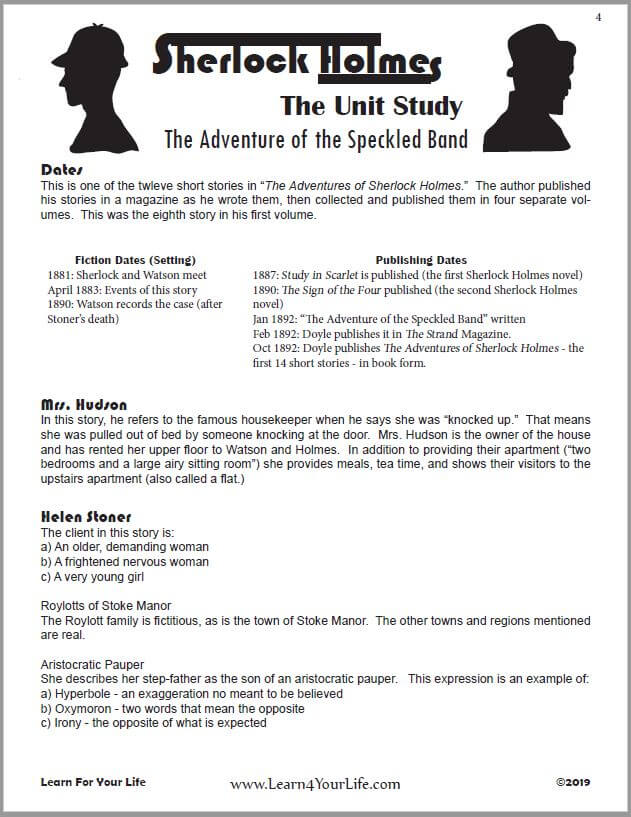
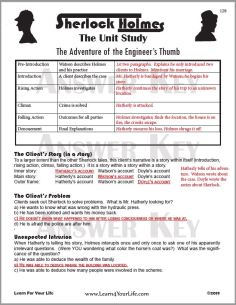
Student Guide AND Teacher's Answer Key Included
$2.99 Download - 183 pages
Eight of the most popular tales demonstrate how to investigate a detective story.
![]()
Sherlock Holmes Pages
A catalog of our pages on Sherlock Holmes.

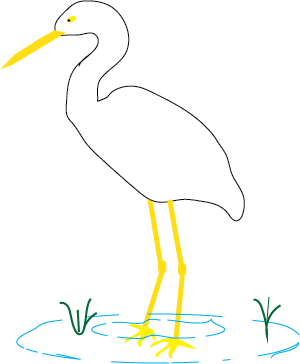
About Our Site
Hands-On Learning

